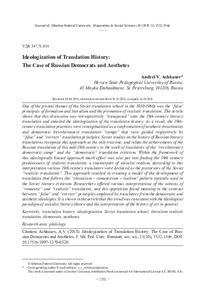Ideologization of Translation History: The Case of Russian Democrats and Aesthetes
Скачать файл:
URI (для ссылок/цитирований):
https://elib.sfu-kras.ru/handle/2311/90261Автор:
Achkasov, Andrei V.
Ачкасов, А.В.
Дата:
2018-10Журнал:
Журнал Сибирского федерального университета. Гуманитарные науки. Journal of Siberian Federal University. Humanities & Social Sciences;2018 11 (10)Аннотация:
One of the pivotal themes of the Soviet translation school in the 1930-1960s was the ‘false’ principals of formalism and literalism and the promotion of realistic translation. The article shows that this discussion was retrospectively “transposed” onto the 19th-century literary translation and entailed the ideologization of the translation history. As a result, the 19th-century translation practices were conceptualized as a confrontation of aesthetic (reactionist) and democratic (revolutionary) translation “camps” that were guided respectively by “false” and “correct” translation principles. Soviet studies on the history of Russian literary translations recognize this approach as the only true one, and relate the achievements of the Russian translation of this mid-19th century to the work of translators of the “revolutionary democratic camp” and the “democratic” translation criticism. Within the framework of this ideologically biased approach much effort was also put into finding the 19th century predecessors of realistic translation, a counterpart of socialist realism. According to this interpretation various 19th century translators were declared as the precursors of the Soviet “realistic translation”. This approach resulted in creating a model of the development of translation that follows the “classicism – romanticism – realism” pattern typically used in the Soviet literary criticism. Researchers offered various interpretations of the notions of “romantic” and “realistic” translation, and this opposition found meaning in the contrast between “false” and “correct” principles employed by translators from the democratic and aesthetic ideologies. It is shown in the article that this trend was consistent with the ideological paradigm of socialist literary theory and the interpretation of the history of art in general Одной из ключевых тем советской школы перевода 1930-1960-х годов были «ложные»
принципы формализма и буквализма и продвижение реалистического перевода. В статье показано, что эта дискуссия была ретроспективно перенесена на литературный
перевод XIX века, что привело к идеологизации истории перевода. В результате практика перевода XIX века осмыслялась как противостояние эстетического (реакционного) и демократического (революционного) переводческих «лагерей», которые руководствовались, соответственно, «ложными» и «правильными» принципами перевода.
Исследования советского периода по истории литературного перевода признавали
такой подход единственно верным с связывали достижения литературного перевода середины XIX века с «революционным демократическим лагерем» переводчиков и
демократической школой критики. В рамках указанного подхода исследовали упорно
искали среди переводчиков XIX века предшественников реалистического перевода,
который мыслился как аналог социалистического реализма. Согласно такой интерпретации самые разные переводчики XIX века объявлялись предтечами советской
школы реалистического перевода и была создана модель истории перевода, которая
соответствовала традиционной для советской критики схеме «классицизм – романтизм – реализм». Исследователи предлагали разные интерпретации понятий «романтический» и «реалистический» перевод, однако эта оппозиция приобретала реальный
смысл только в рамках противопоставления «ложных» и «правильных» принципов
представителей демократической и эстетической идеологий. В статье показано, что эта тенденция соответствовала идеологической парадигме социалистической литературной теории и интерпретации истории искусства в целом
Коллекции:
Метаданные:
Показать полную информациюСвязанные материалы
Показаны похожие ресурсы по названию, автору или тематике.
-
The Dictates of the Market The Future of Profession of Translators and Interpreters in a Post-Socialist EU-Member State
Pokorn, Nike K.; Покорн, Нике К. (Сибирский федеральный университет. Siberian Federal University., 2016-03)The article outlines the changes of the profession of translators and interpreters, and the development of the translator and interpreter training at the university level in the Republic of Slovenia, one of the post-socialist ... -
Дело Калипари: махинации политиков и манипуляции журналистов
Федеричи, Ф.М.; Federici, Federico M. (Сибирский федеральный университет. Siberian Federal University., 2011-10)В данной статье рассматривается case-study, изучающее отношение итальянской прессы к некоторым переводным источникам. Исследуются вопросы перевода, связанные с языковыми средствами манипулирования и затронутые журналистами ... -
От иностранного языка к переводу, или Via Scientiarum
Кононова, В.А.; Kononova, Valentina A. (Сибирский федеральный университет. Siberian Federal University., 2011-10)В статье рассматриваются некоторые аспекты преподавания перевода в университете в парадигме личностно ориентированного образования, а именно: роли преподавателя- переводчика и студента, переводческие стратегии. К обсуждению ... -
Системный подход к подготовке переводчиков
Сдобников, В. В.; Sdobnikov, Vadim V. (Сибирский федеральный университет. Siberian Federal University, 2023-07)Автор обосновывает необходимость использования системного подхода к подготовке переводчиков, создания единой системы подготовки переводчиков, элементами которой являются виды учебной и внеучебной деятельности, объединенные ... -
Translating Linguistic Terms from English into Kazakh: Direct and Indirect Ways
Zhumabekova, Aigul K.; Жумабекова, А. К. (Journal of Siberian Federal University. Сибирский федеральный университет, 2024-08)The research aims to study methods of translating linguistic terms from English into Kazakh based on two newly translated textbooks for translation quality assessment. Linguistic-translation study of the source and ...

